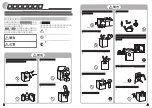
en
23
Ambient temperature
and ventilation
Ambient temperature
The appliance is designed for a specific
climate class. Depending on the climate
class, the appliance can be operated at
the following temperatures.
The climate class can be found on
the rating plate. Fig.
+
Note
The appliance is fully functional within
the room temperature limits
of the indicated climatic class. If
an appliance of climatic class SN
is operated at colder room temperatures,
the appliance will not be damaged up to
a temperature of +5 °C.
Ventilation
Fig.
3
The air on the rear
panel of the appliance heats up.
Conduction of the heated air must
not be obstructed. Otherwise,
the refrigerating unit must work harder.
This increases power consumption.
Therefore: Never cover or block
the ventilation openings!
Connecting
the appliance
After installing the appliance, wait at least
1 hour until the appliance is switched on.
During transportation the oil in
the compressor may have flowed into
the refrigeration system.
Before switching on the appliance for
the first time, clean the interior of
the appliance (see chapter “Cleaning
the appliance”).
Electrical connection
The socket must be near the appliance
and also freely accessible following
installation of the appliance.
The appliance complies with the
protection class I. Connect the appliance
to 220–240 V/50 Hz alternating current
via a correctly installed socket with
protective conductor. The socket must
be fused with a 10 to 16 A fuse.
For appliances operated in non-
European countries, check whether the
stated voltage and current type match
the values of your mains supply match
the values of the mains supply. This
information can be found on the rating
plate. Fig.
+
Climate class
Permitted ambient
temperature
SN
+10 °C to 32 °C
N
+16 °C to 32 °C
ST
+16 °C to 38 °C
T
+16 °C to 43 °C
















































